#my name is suleyman
Explore tagged Tumblr posts
Text
Let’s save lives.
You may or may not know that I am a rather empathetic and engaged person. Ever since I was a little girl, I was raised with the mindset of being kind to others and understanding, of never underestimating a person’s value and do as much good around me as I possibly could. I was taught that being different didn’t give me the right to look down on or diminish others, because I myself would not appreciate that someone else would do that to me. My family and I have sadly an history of being underestimated, belittled, disrespected because of our differences. Yet, these struggles have made me who I am today. I strongly believe that no matter our differences, people can gather and create a virtuous circle to counter the negativity around us. With this post, I hope that you can be a part of it.
I humbly ask you to spread this post around so that people may know that such charity funds exist. Launch good, gofund.me and other funding platforms have many other ongoing funds that cover all kinds of issues. If the funds I am sharing with you do not resonate with you, maybe consider looking for funds that matter to you and spread the word around. Any initiative to make this world a better place is valid. Whether it is to grant an equitable access to food, homes, education, healthcare, to educate about tolerance and protect any minority, to preserve our beloved and precious Earth, to protect our youth, to fight for gender equality, to protect our predecessors, our women from harm. To ensure anyone can safely express their opinion and beliefs without having to fear for their life and face constant criticism. This world can only be safer if we work hand in hand.
I choose to believe that our sense of being human will prevail. I choose to believe in all of you. May you stay safe and be blessed 🙏🏼 I warmly thank anyone who will take the time to read this and consider to make a change in any way they can. I love all of you 💛
#just-a-ghost#other content#solidarity#emergency funds#humanitarian initiatives#fund raising#verified fundraiser
38 notes
·
View notes
Text
Hi guys. Amani Sharif reached out to me to spread her gofundme to evacuate her and her young family out of Rafah. The gofundme itself has been vetted and the money is being processed by a woman in the UK- you can read more on the page. I know it’s easy to see donation posts and think that it’ll take time and effort, and that someone else will do it, but even if you donate the amount of money you’d spend on a coffee, it adds up, and it could mean safety for Amani and her family. Please take the time to donate.
#free palestine#free gaza#all eyes on rafah#gaza donation#Palestine#palestine donation#from the river to the sea palestine will be free
21 notes
·
View notes
Text
Power and status of ottoman princess
Title and honorifics
Before the rule of sultan Bayazid II every high ranking woman were called Hatuns,including mother,sisters,aunts and daughters, however thier social standing was naturally higher than non imperial women. The way to adrress them was Hatun that was used after their given name,for example, Gevherhan hatun,daughter of Mehmed the coqueror or effendi that would have similar meaning as mistress.
After accession of Bayazid II his daughters and granddaughters were given title of sultan,however non of his living sisters or aunts got the honor. Later on proper way to adress them woulf become “Sultanim”, which would mean “my sultan”,or again “effendim” by other members of imperial family. I would like to underline that contrary to what wikipedia states, there is no records that I know,where princesses where called with “Devletlu İsmetlu” like Valide sultan and Haseki sultan were.
The term “sultana” that was made more feminine by Europeans never existed in ottoman language.
Family, Marrige and Issues
I want to start discussing their family with brothers,it’s widely known fact that before suleyman there was “once concubine,one son” tradition therefore if shehzade/Sultan had full-sisters they were all older,that is one way to deduce if princess of unspecified mother was full sister of half sister of reigning sultan. Naturally Shezades had closer relationship to their full sisters as they were leaving with him and their mother,when he was appointed as governor of princely province. Their latter life would be spent in their brother’s harem before marriage.
being half sister of sultan did not automatically mean that their relationship would have been stained,however mostly,princess would favour full-brother over half,but were treated by same respect regardless who ascended the throne. It was different case when imperial princess had no full brother at all,for example Sah Huban, she had very close relationship with Suleyman,even closer than his deeply respected full sisters.
Their marriages,much like any other princesses of any country, was political,arranged by their parents to strengthen standing of their father or brother,for example daughters of Selim I were firstly married to powerful politicians,so their father would have supporters in his rebellion,while their second marriages were arranged to help Suleyman in his early reign. Their husbands were usually much older than them, therefore marital life was likely not consensual and in no way their choice. For example,Rustem paha,husband of Mihrimah,was same age as Hurrem,her daughter’s fate was even worse as she had to marry peer of her own grandfather,however given the fact that they had 8 children,marriage can be considered successful. After the Marriage princesses were getting their own little “Harrem”,where they had great rooms for themselves and their servants,where even their Husbands needed permission to enter and even refuse to have sexual intercourse with them,sometimes their marriage could end unconsumated and after some time princess could use another of their privilege-divorce. Reason of divorce could have been different: Personal attitude,mistreatment,political move or adultery. It was made clear,especially by Suleyman,that imperial princesses were full-fledged members of imperial family so they ranked higher than their husbands,therefore having relationship with other women was their humiliation,which would lead to divorce, after which they would retire in old palace and could refuse to remarry again.
Only their first degree descendants would be given imperial titles.
Daughters- Hanimsultan(with Ayse Humashah as exception)
Sons-Sultanzades. They ranked even below non-sultan imperial consorts and some of the highest ranking harem servants.
Hierarchy and Power
They actually had equal standing in ottoman hierarchy. As female members of dynasty they had the same status and privileges,were reffered as sultans and often received relative stipend.( Which was on average 200 akche a day, for comparison, Valide sultan had around 2000-3000 depended on time period, Haseki sultan 1000-1100(Hurrem as only exception,who got stipend of Valide sultan ) Gulfem,who was almost regarded as member of family herself was recieving 150, Nurbanu’s trusted friend and one of the highest ranking non-sultan woman ever Canfeda received 200, Mahidevran only received 40 and avarage stipend of cariye was 2-4) Besides, sisters of sultans were technically daughters of sultan, though the deceased one, still they were treated with great respect much like their late father. However, birth order was important thing in ottoman society so younger sister respected older and bowed to them as well as nieces bowing to aunts regardles of their martial or fianacal status. Therefore saughters of sultan,as nieces, were calling sisters of sultan,as aunts, “effendi" out of respect.
In conclusion, even if they had same social standing, sisters of sultan were still bit ahead daughters of sultan formally.
However, Granddaughters, Nieces and cousins of sultan,despite the same rank, were less prestigious.
Despite their relative social status and order of birth their actual power was dependent on several factors:
1. Their relationship with Padishah,Valide sultan or Haseki sultan. They had higher rank and much more evident political power, they still needed their permissions about major decisions,even if it were their right, so being on good terms with them was a good move. Half-sisters naturally were not as favoured as full-sisters by Valide sultan,but with padisah had more options, they could have been supportive, religious, charitable and obedient another way was sending beautiful, well-educated concubines,who could have become Haseki(after 1533), that is when their good relationship begun,most of Sultanate of women memebers were raised at their court and remained in favour after they became Valide Sultans, in that case even some of the Padisah’s expressed gratitude and gratefulness for raising their mother, (such occasion was Ahmed I’s attitude towards her aunt which I will discuss below.), they could also donate money to wars, harem managements and charitable projects, either all their own or assist Haseki sultan.
2. The second way to gain power was wealth. Money opens many doors and it was like that in the past. They could establish some business or even receive bribes.
3. They could also gain power with marriages, it was not only beneficial for their brothers,but for them as well. If their husband had a high rank, they could keep an eye on the political situation and act accordingly, they would use that influence to assist their brothers, who,In turn, would be extremely grateful for their support.
Comparison between Ottoman and European princess
Status- Status of European princesses depended on their marriage. Being princes was not guaranteed power,but only a formal status. For example, Margaret Tudor was below prince Henry in rank but when she married by proxy to Scottish king, she outranked him and demonstrated that by walking in front of him. On the other hand, another sister Mary married to Charles Brandon and was Duchess of Suffolk ever since,while Status of Imperial princess remained the same.
Opportunity- European princesses could have become Queen consort and Queen mother and veiled immense power, while imperial princesses could never become Haseki or Valide.
Marriage- Ottoman princesses were usually older when married and outranked their husbands,while European princesses were always below their husbands. Sultan could also refuse remarryin,while European princesses had no such right
Freedom-European princesses were less limited by social customs.
Consummation-Ottoman princesses had the right to refuse Consummation without a deadline, while European princesses had to Consummate marriage even if they were twelve, unless of course parents arranged it other way.
Divorce - it was right of ottoman princesses to divorce their husbands,while for European princesses it was a rare privilege.
Despite so many differences, one thing was same- they had a loveless purely political match .
Powerful ottoman princesses
Here I Rank ottoman princesses,who had considerable power and influence, sorted by date of birth.
P.S gifs are from MC and MC:K,but some characters might represent different historical figures.
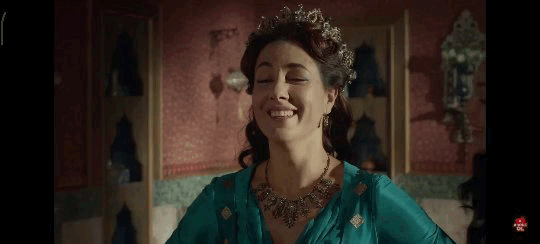
Fatma sultan
Fatma may have been the second child of Ayşe Hafsa and Selim I . She was born in Trabzon around 1492 and spent her childhood there. When her younger brother Süleyman received his own princely province in 1509, she probably accomponied him to Caffa with their mother.
She was married in 1516 for the first time,but it soon ended in divorce and Fatma returned to Manisa. She gained considerable influence as she was most likely the sister,who was recorded to be in Manisa, helping mother manage harem and protect Suleyman from their father. If legends are true and Selim was indeed trying to kill Suleyman,that she had hands in saving him. Most likely, Fatma and her mother were instructing young sukeyman,how not to deserve the wrath of father and covering his mistakes. After Suleyman ascended the throne, she was married again to Kara Ahmed pasha in 1522. Marriage lasted long,but did not produce any child, so either fatma was infertile (Kara Ahmed pasha had two daughters that are disputed to be fatmas,but they were likely from previous marriage) or the match was not happy and Fatma refused sexual intercourse, however considering her reaction to his death, it was most likely the former.
According to what we have Fatma seems to be quite free spirited as depicted in the series. She was wealthy, cunning and might have been fond of parties. She had hands in financing some of her brother’s campaigns and even won the favour of janissrries. However, in 1555 Kara Ahmed pasha was executed by the efforts of Mihrimah and Hurrem and Fatma was married to eunuch and banished from the capital for hed intrigues against them She died either in 1557 or 1573.
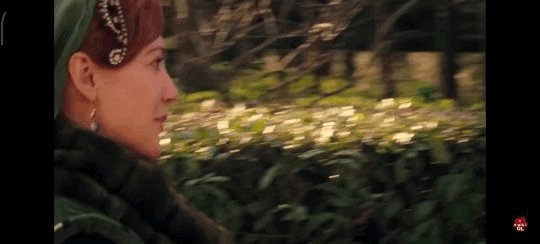
Sah huban sultan
Daughter of Selim I and unknown concubine, born in 1500. As she has no full brothers, she was very close to Suleyman and their father, with whom she spent most of her childhood. Considering Suleyman’s great respect for her, Sah was likely a supporter of him and helped to deal with Selim I.
She was married in 1523 to well-educated and intelligent Lutfi pasha with whom she shared religious thoughts and beliefs. Marriage, however did not seem to be successful the couple only had one daughter and Sah refused to have a sexual relationship ever since. She was very pious, intelligent,outspoken and fierce in nature. In the only description of her daughter Esmahan Burnaz, it is said that she was arrogant and demanding and it was Shah’s domineering attitude in the family that was blamed for it, as by this “she had ruined the role of woman” in the child’s mind. However,that was recorded by the European ambassador only, who had never met any of them and probably heard some rumors or made it up after an ugly end of their marriage.
In 1541, Lutfi pasha punished a prostitute for adultery by mutilating her genitals.Şah could not tolerate the humiliation and mutilation of a woman without a word, which is why she got into an argument with her husband, who hit her . Şah had Lutfi pasha beaten up and immediately asked his brother to allow the divorce. Süleyman then exiled him. Şah remained with her brother in Istanbul for the rest of her life and supported the wife of Süleyman, Hürrem, in carrying out her construction projects. She lived a modest life in the Old Palace and devoted all her time to charity and religion. Shah had excellent relationship with Hurrem and Mihrimah and in my opinion, close bond between aunt and niece helped young sultan to shape her mind and characteristics. She died in 1572 and was buried in her father’s complex.

Mihrimah Sultan(1522-1576)
Her life is very much known. She was the most powerful imperial princess in the empire, so I will just list some of her achievements:
1. Her stipend was 600 akches a day during the reign of three different Sultans. it was three times as much as regular pirncess
2. She had correspondence with Catherine de Medici and other foreigner diplomats, who would often send her gifts to help them in some political affairs.
3. She financed some of Suleyman’s campaigns all her own
4. She built a whole fleet of 400 ships.
5. She had three palaces and two mosques
6. She served as sole de facto Valide from 1558 to 1566 and shared it with Nurbanu from 1566 to 1574.
7. After the death of Bayazid Mihrimah banned everyone from laughing and sent back clothes to Suleyman and Selim who were secretly planning a grandiose wedding, that was cancelled by Mihrimah and instead a very plain ceremony was held.
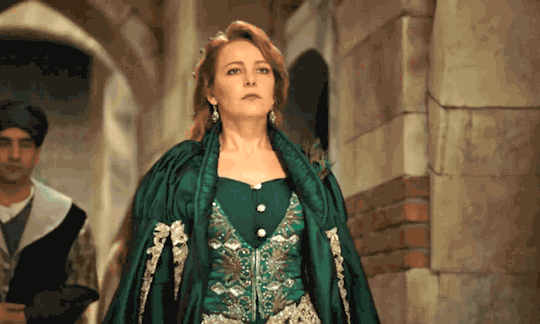
Humasah 1543-c.1582 or later
She was a posthanous daughter of Shehzade Mehmed and despite being only a daughter of prince, she was given the same privileges,but greater power, as any other sultans. She was one of two favourite grandchildren of Hurrem and Suleyman. She married three times,but the source of her power was a good relationship with Sultans. She was the one who raised Safiye and gifted her to Murad, so her power reached it’s peak during his reign.
She financed many construction projects,but was buried in a mosque that was built by Hurrem and Suleyman for her father.

Ayse Humasah 1543-1594.
Daughter of Mihrimah sultan and Rustem pasha, she was practically the same as her cousin with whom she shared many things started from date of birth and ended with their name. Ayse Humasah was the only woman born to an ottoman princess,who was herself addressed as sultan and her children were considered members of the dynasty. She was married two times and her influence was extremely great during the reign of three Sultans. Her power reached it’s peak, when her husband was appointed a grand Vizier and she had hands in very major political decision.
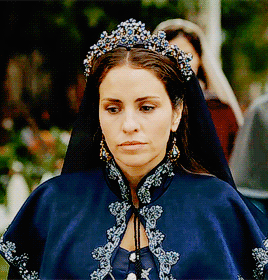
Gevherhan Sultan. 1544-after 1526.
Eldest child of Nurbanu and Selim. She was married to Piyale Pasha, an admiral who died in 1578 and she was remarried in 1579. She was one who raised Handan and gifted it to the prince, for which not only Handan was grateful, but her son Ahmed as well, who after his accession gifted very expensive furs to Handan, Gevherhan and Safiye. The second gifts were given to Handan and Gevherhan only,which indicates that unlike Safiye,she never fell from his favour. Peak of her power was from 1598 during her husband’s grand vazirate. She did a lot of charity in her life.
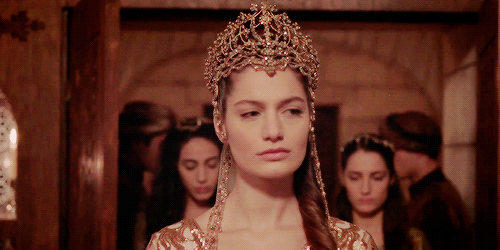
Ismahan sultan 1545-1585
Daughter of Selim and Nurbanu,she was married to Sokollu Mehmed Pasha and Through her husband and her own rank, Esmehan was the most influential sultana of the empire for years. In wealth, only her aunt, Mihrimah, could overtake her, but in influence, almost no one could. She constructed several projects and had foreign diplomatic affairs, most notable her correspondence with Catherine de Medici. She had a very artistic and dramatic personality, often throwing parties and shows. She was recorded to be very much alike Hurrem,both of them were short, not conventionally beautiful,but very intelligent. She was heavily involving herself in politics with her mother.
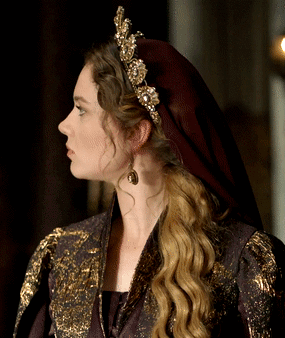
Burnaz Atike Sultan
Sultan Atike was born in 1614 or 1615 and although some sources consider her to be the daughter of Kösem, she was certainly not her child. That can be supported by the fact that she supported Turhan’s rebellion and had a good relationship even after kosem was killed. She was one who raised Turhan and remained in friendly terms for both Turhan’s gratitude and their shared politican views. Atike was noted to love children very much,but had none on her own, so she was involved in raising her nephew,who regarded her as second mother and listened to every of her advice.
She died around 1570.
I hope you liked it, I think it’s unfair to only talk about Mihrimah,while there were so many powerful and intelligent Princesses. I did not talk about Esma sultan as she was in later centuries and I am not fond of her times.
Which ottoman princesses are you favourites?
If i accedentaly missed something out you can ask it in comments
#historical drama#period drama#history#sultanas#valide sultan#medieval women#nurbanu sultan#hurrem sultan#mihrimah sultan#safiye sultan#kosem sultan#turhan sultan#magnificent century#magnificent century kosem#mc: kosem#sultanate of women#sultan suleyman#haseki hurrem sultan#ottoman history#ottomanladies#ottoman empire#15th century#16th century#17th century
144 notes
·
View notes
Text
so for the past year, i've been working on a fix-it-fanfic of MC. i went a little bit too creative and my ideas ended up going so off rails that it divulged into an entirely original thing with its own mythology. picture how ASOIAF is based on the Wars of the Roses but exactly an adaptation of it.
(keep that in mind as you read this. i will refer to the characters as "Hurrem" and "Mahidevran" but it's only for you to get the idea. they're not actually named like this in story)
THE THING IS. i'm super anxious and insecure. i'm writing this to get courage to finally post it. so MC fandom, would you be interested in reading an adaptation that has the following:
1. a Hurrem that is not portrayed as inherently evil or a villain with some redeeming qualities but an actual smart ambitious young girl that is trying to survive and get autonomy in an awful situation. a Hurrem that finds herself in an almost military-like environment with strict rules of ettiquette that rises in status only because she disobeyed the very same rules. a Hurrem that is not disliked by others because of her some inherent evil within her, but because people are scared she challenges their traditions. because the other harem girls find it unfair she gets privileges despite not following the "rules". Hurrem that gets to break the "one son" rule and gets to be the first ever Haseki.
2. Hurrem and Suleyman that actually get to be the closest thing to a healthy couple in a fucked up environment. Hurrem and Suleyman that managed to create a nuclear family amidst a cold, brutal harem that only exists for reproduction. Hurrem and Suleyman that actually bond over their interests and their trauma of seeing their family members die. and i cannot stress this enough, Suleyman that doesn't cheat on her!!! so no concubine arcs!!!
3. Mahidevran that is the water to Hurrem's fire. Mahidevran that willingly plays the madonna to Hurrem's whore as an effort to garner support for herself and Mustafa (while we're here, a Mustafa that is a gigachad and not a disney prince lol). Mahidevran that was in love with Suleyman at some point but chooses to let go of those feelings because "everyone goes through this eventually. everyone is disgarded once they birth a son. i might as well find happiness in raising him" only for everything to come crashing back once she sees Hurrem does not go through this
4. Ibrahim that sucks even more but is actually portrayed as such lol
5. FOCUS SOLELY ON THE HAREM. its from Hurrem's POV, so it's only the harem intrigue. sometimes it's your typical teen girl drama, sometimes it's a romcom, sometimes it's a brutal murder mystery trying to figure out who tf tried to kill someone. sometimes its just straight up horror
6. Nigar that gets a happy ending. that's it
7. focus on how the system truly sucks and no one is actually that evil
40 notes
·
View notes
Text
PLEASE HELP AMANI SHARAF!!! she is a mother of two trying to recover from being displaced after a bomb directly hit her house. anything helps!
PLEASE REPOST OR SHARE!!
#free palestine#all eyes on palestine#save palestine#palestine#all eyes on gaza#all eyes on rafah#save rafah#free rafah#free gaza#gaza genocide#gaza strip#gaza#rafah#gofundme#refugees#rafah under attack#keep eyes on rafah#save gaza#stand with gaza
9 notes
·
View notes
Text
"I’m not sure my parents considered the military underpinnings of the organization, or the patriotic ones, but I learned to swear to serve 'God and my country,' despite the fact that God was not a man my two-faith family followed with any vigor, though if I named him in vain, my mother would say, 'Let’s leave God out of it.'"
Quote selected randomly from page 201 of the nonfiction essay collection The Good Immigrant: 26 Writers Reflect on America, also known as The Good Immigrant USA. Book was edited by Nikesh Shukla and Chimene Suleyman. Quote is specifically written from Jean Hannah Edelstein.
Additional notes: Quote selected specifically from Jean Hannah Edelstein's essay An American, Told. The organization she is speaking of is the Girl Scouts of America. This is the current record holder for longest sentence in the Random Sentence Library.
Quote was selected at random from a book chosen at random from my local library.
#Books#Quotes#Nonfiction#Essays#Essay Collection#The Good Immigrant#United States#Race#Jean Hannah Edelstein#Nikesh Shukla#Chimene Suleyman#An American Told#Girl Scouts#Religion
3 notes
·
View notes
Text
I still have plenty to say on the topic, so bear with me, the original link is here, it would be too much there I think.
Anyway thank you Sol @palaceoftears for these tags that succinctly sum up the main point of the original post, let's bring them as starting point here:
#joanna you ate this!!! missed reading you#truly love how deeply you analyzed that confronting suleyman IS confronting the system!#also the freeing aspect because like freedom doesn't have to mean happiness?#yes ofc hurrem wouldn't be happy knowing ultimately suleyman didn't love her & her children over himself#but it's still freeing to not live yout whole life brainwashed lol?#like I never get how ppl that loves her watch her going from 'i'll kill the sultan' & 'don't treat us as animals' to dependant on suleyman#and just go 'happy ending :D' about it#mahidevran sultan#hurrem sultan#sultan suleiman#magnificent century#muhtesem yuzyil
You know how much I dislike Surrem, but I absolutely get people shipping it without getting it like "happy in love" (huge kudos to my sis Tisha) since it's an extremely complicated, mutually toxic relationship, while yes they do love each other at same time. But they are both each other's heaven and hell simultaneously throughout the whole show, with Hürrem being in worse position due to power imbalance. Power imbalance that never fully goes away. He might also be dependent on her in emotional way since he himself comes to belief she is the only person who would never betray him (because she truly had least benefit in it). Don't be fooled though, if she had e.g. crowned Bayezid in S3 as Sah intended, he would have shown her no mercy. /I once mentioned a bit about them, also historically here./
And LBR she got mistreated by him (please, he told her to kill herself for him, and the goal was not to determine whether she had poisoned Mustafa truly) multiple times before S4, it was only because of the topic covered I mentioned S4 stuff, especially related to how he screwed her kids.
People think of stuff in "tangible" categories and why stuff like mere "awareness" (without leading a revolution or whatever lol) seems to have little meaning.
Which is again one of the main themes of the show - to give voice also to those who lost and as such do not have the "but we won, we were happy, we lived" defence always acting for them. Bah, even controversies or discussions surrounding them. They are losers, not even worthy to talk about, and put on sidelines. We often discuss what motivated the "big figures" who got to become rulers, even if we do not approve of their actions or criticize them. Rarely we talk about "losers". Which is what Mustafa's letter stressed - people will deem me as traitor, while your name will be written in golden letters because of all your victories. This alone will make your name remembered. And even considering that Mustafa was lucky in that people generally did not believe him to be a traitor, with Bayezid it was much harder because yeah he did openly rebel and it's not something we can deny. But some jump to conclusions like 'he was insolent and one day decided to rebel for no reason' (yes, I've seen such takes) is very simplistic. I do not even approve of a lot of his actions there since while I get his anger at Suly and Selim I hate how he involves plenty of soldiers in a fight without a chance to succeed as long as Suly ass lives, but damn takes like above truly erase what brought him to such point. Because he was the prince with bigger support at that time. He could have waited for his father to die soon and easily taken the throne. /And historically - yes if you actually dig up sources, he didn't wake up and decide to attack innocent cookie pacifist Selim lol/. Show! Bayezid telling Defne that he would be labelled as a "rebellious prince" for future generations with obvious evidence backing it up means a lot because even though he IS one, there is so much more to this story and what bought him to this point, starting from his father's attitude to him since he was a kid.
And damn I do need to stress the need for the critical approach to SOW (which does not preclude stanning the characters/getting interested in historical figures ofc)? Maybe not here, but I still see TikTok shit on “The big 5” introducing feminism to Ottoman harem. There is no revolution we can talk of in any case, but truly, where is feminism involved in Haseki institution? It only privileges one woman over others. The others are still required to serve them, which is why we had the Hürrem/Gülnihal and Nurbanu/Valeria stories. And what it ties with what Sol says once Hürrem tries to kill Gülnihal - her parents' ghosts appearing to tell her It's not revenge. It's not what you promised us. Meanwhile, the men are still in power, with a person like Suleiman having unlimited agency. More.. the man selects the woman he gives those privileges too. And even if he grants her freedom (if HE pleases so), it has little actual effect because we all know she is still forbidden to leave him and would have lost her kids anyway if she had done so. Thus said, the moment when show Hürrem slams the door to Sulyass' stupid face is one of my fave Surrem moments without a doubt and one of fave H moments in general ahsmshs. / BTW One day I will finally talk how Westerners focus more on say legal marriage when it that system having multiple sons was more ground-breaking because even free brides from noble families who did not have children had little power and agency. /
There is plenty of irony involved, just as Mahi finally freeing herself from attachment to Suly once he rejects her freedom to which he is entitled by the System. Bah, only he has the power to do so regarding his women. It's all only at his own discretion.
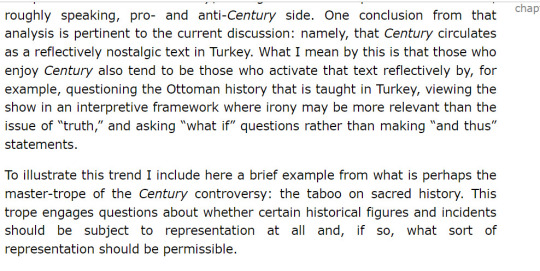
It is precisely what I also mean by "taboo-breaking" and the questioning Mahi does of Suleiman and the way he (as Sultanate) operates. In that world mere questioning could break the taboo. We do not know what future lay ahead for anyone, but damn what he kept doing was neither just nor wise according to the very norms of the times themselves. Yes, Mustafa was the most promising and fitting candidate for the throne and he did not betray his father, so Suleiman removing him from "open succession" was not even why this method of succession had been established in the first place and demanded from princes assembling their own support, also ensuring that he would be easily accepted to prevent discord and rebellions. Mustafa did it too well, the horror. And that him wanting to do something (also as he himself stated, since he got privilege of being the prince and be able to rule, he should not sit idly, but use it for good purpose and the people) only brought him troubles because of Suly ass own ego only shows again the problems with this system and being centered on one person so much. Suleiman violated a lot for his own agenda, centered around himself, not the future of the state. This is what Mahi is criticizing and stating it to his face when he tried to paint his son as a traitor to present himself as just and acting for the state IS taboo-breaking in itself. Asking the question instead of dismissing it all as "fate", as Mihrimah tried.
Mahidevran tries to awake Mihri, who while rich and "still in power play", is very similar to her in many ways (also with the one big sin that has weighted on them silently). They all lost. Even Selim. Getting Mihri's brother (Hürrem's son) on the throne did not mean triumph and happiness for her. Heck, even Selim is a walking wreck. It's not even about sides because SS truly managed to destroy everyone's lives, not only one side's, so in the end it's not even favoritism. All for him to go with his beautiful words, a show-off victory, and his beloved throne (while saying something else in his monologue). Mahi telling Mihri to stop holding her father blameless IS the moment making someone else's eyes open and maybe do not let actively go for something that will not help anyone out at this point, like causing discord between Selim and his son. These are small things that are important for the theme and how mental freedom is also of value. Same with awareness. Nobody expects revolution or claims something. And we are at a particular point when Mahi already lost Mustafa and says it already in the context with him gone. She won't resurrect him with her words ofc LOL. And Mahi truly didn't have to do this, just take popcorn and look at Hürrem's kids & other descendants fighting even more.
You can precisely see when SS decides how to dispose of Bayezid when Mihri says she will never forgive him and will be dead to him if he executes her brother. The lightbulb over his head in this moment lol. So her continuing to hold him blameless, while putting everything on Selim and Nurbanu is buying his shit and rules of the Sultanate. Mihri might have power, so she can stir things up in attempt to still "win", but.. they all lost. Her acceptance of it and stating it out loud before leaving Topkapi again has meaning. One might continue to have power and live in palace (unlike Mahi), but they all lost anyway. Mere meddling that can cause only chaos to still try to win is meaningless and can ony be harmful. As such, Mahi's words can have at least some impact.
Mahi and fate as Sol's post with Plami's commentary also has this delicious tidbit with mirror - most likely Hürrem would have never ceased to hunt down Mustafa after Mehmed's death because she had decided on eliminating him long before that and kept carrying out the plan via concrete & repeated actions. However, Mahi still questions herself on that because she can never know. And even if it changed nothing, it still tormented her and polluted her conscience. Because culpability is still there, regardless of "system" and circumstances" and whether it has any tangible effect or not. Same with Selim still being culpable even though SS wanted Bayezid executed. He still chose to do so anyway. Bah, he is actually very self-conscious and states clearly that he won because unlike the others he was able to kill his brother.
Similarly, Mustafa, Cihangir, and Bayezid also made their choices. Mustafa could have axed Suleiman and it would have been hard to blame him for this in the situation it boilt down to. Actually, he was the one with biggest support at that moment, so rules of the Sultanate definitely allowed him to dispose of an aging ruler who began making a multitude of mistakes. He had the biggest power at his disposal if he wanted to. Moreover, Musti also chose to invite the member of the opposition faction because she was his sister, despite said sister openly declaring her standing on the opposite side and speaking to him "with her mother's words" last time they met. Once more, instead of rules of Sultanate and how the system expected him to act, he chose familial bonds.
Then again, Bayezid did have Selim on his knees in front of him and chose not to kill Selim, despite Selim never promising him any change or begging for mercy.
They both died, but they also could have chosen differently and compromised their conscience and values in the process.
Yet the opposite choice to adhere to the Darwinist rules and get the throne at any cost is not something mechanic that promises happiness or safety, either. Actually, it can make you painfully blind. We see Hürrem deciding blood will be spilled only of her enemies once she learns her son is going to end up on the throne. When she meets with the witch after Mustafa is dead and the throne for one of her sons IS a certain thing.. it's not what she wanted to hear, starting from her own imminent demise from natural causes. Same with her trust in the "human face" of the Sultanate aka Suly ass:


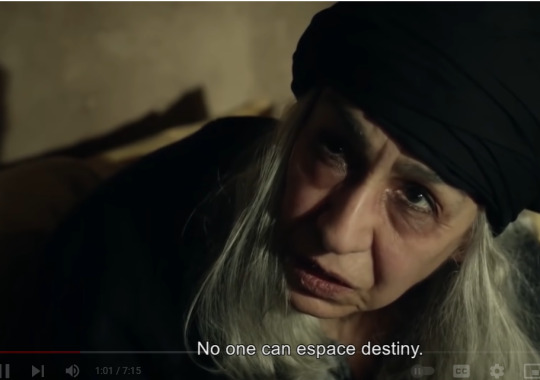
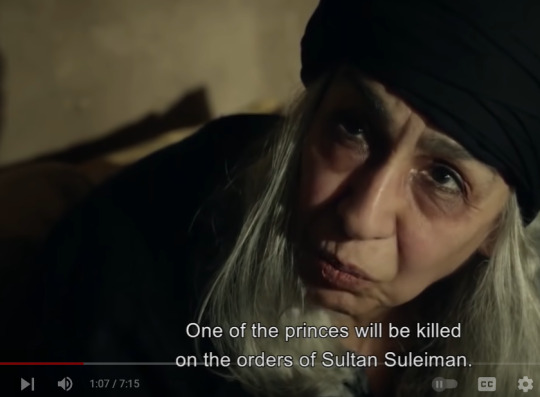


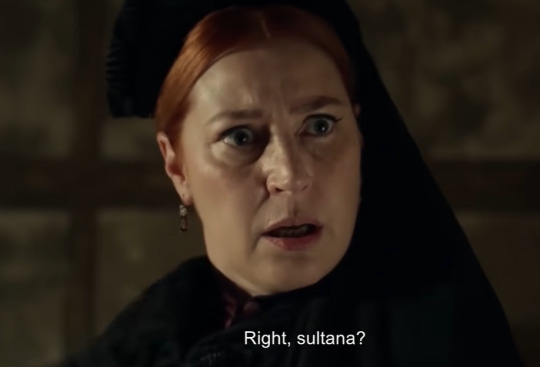
The "right, sultana?" is an ironic call-back to the beginning of the episode when she uses same words about Suly's power to exclude herself from the matter of Mustafa's death.
Also let us note the use of the word "destiny"😱 .
Also, Hürrem did not come back to ponder her preceding conversation with the witch earlier, as she had another proof of herself not interpreting it correctly - when she assumed Nazenin's baby would be the one the witch predicated as the Sultan. Nurbanu was after all pregnant with Murad at the same time.. so no, the witch was not mistaken, Hürrem was simply so caught up in her own vision of how it would go (also with Baye taking the throne) or assumed the witch to be mistaken, so she didn't notice it was about her grandson.
Another interesting thing is that the witch also predicts Mihrimah's future and that while her physical illness will pass soon, the spiritual pain will soon start and persist.
Because even if we "win" in that we survive, it does not need to bring happiness with it. At all.
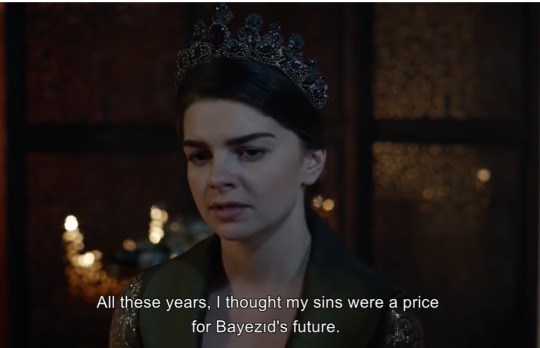

It doesn't work like this either (Mihri talks about sacrifing Musti and Cih), while we are at it. There are no simple mechanisms like that! And how Mihri adopts her mother stance and calls her out that only one of her sons can survive according to the Darwinist rules (which is also what Rüstem advocates in any circumstances, only for him there is no support for Bayezid really... any can go) is just irony at its finest, and it stems also from her feeling of guilt - I already tainted my conscience and went again familial bonds, so let it at least mean victory for my favourite brother. She is now quick to accept one of them will die, she just wants to ensure it's not Bayezid.
Another of Hürrem's children that do adopt her "survival no matter the cost" agenda (and no, it's hard going for that to "pacifism" agenda shortly after getting what you wanted), and to a bigger extent, is Selim obviously.. Selim states to Bayezid that he will live because he is capable of killing his brother for his own survival. But we know what sort of life this is (and that he won't live long from history). He might later quote his mother to Mihrimah and convince himself that since nobody is innocent under this dome, so only the deserving win, but outside that, he does call himself a "brother killer" and does consider it a burden. /And Selim being his mother's son is another fascinating topic, since he was like.. her least fave and yet he is the one most alike her and who most absorbed her views and agenda.. to later emerge as sort-of third unexpected faction /.
Neither Mihrimah nor Selim ever found peace after adhering to the System's rules of fratricide. Bah, they cannot even be a family again as the only surviving members.. instead they openly accuse each other of being brother killers. Judging by history, they will eventually learn to co-operate, but nothing will be the same ever again. There is no moral victory in it for sure. Selim does not claim it any point. Actually, he is the one to point out that: We all lost. Innocence died and nothing will be as before. We can accuse Selim of many things, but he is a pretty self-conscious character indeed.
The others might be dead, but they did adhere to their principles and values due to choice.
The power of reflection or questioning is also tied to to the concept of choice as what makes us a human. MC never promises us happy ending (how it could, we all know the ending point), but the mere presentation of choice, of humans trying to create something positive, like Mustafa, Bayezid, and Cihangir deciding not to fight against each other as expected, is meaningful.
Instead we got nobody truly winning or benefitting from what happened LBR. It cannot get worse than that, really.
The whole issue again reflects what I said earlier in that post on how Erdogan historical propaganda works. It's not all sunshine and rainbows, but there is no questioning at all. Instead we have normalization of violence and presenting it as something necessary, and that there is no choice or alternative to what happened. The sultan killed his brothers, but he had to. It was necessary, it was automatic. There is even no person behind it, but a robot always doing the right (even if brutal) choice because "it was like that".
And to some up the great ironies of life, we can remember that Mahi who lost it all... survived them all, so she won the Darwinist game in the end despite being rejected by System multiple times:


#all the ironies of life indeed#'the strongest survive and win'#as if#regarding everything in this statement#the topic of free choice vs system vs fate is soo fascinating in MC#Maybe will talk even more on the topic#let's see#mods opinions#meta
13 notes
·
View notes
Text
here's to palestine:
why is palestine so important to muslim?
lets see..
Allah has named palestine as the "Holy Land and the Blessed Land” in the Quran. It’s mentioned in Surah Al- Ma’idah ( 5:21 ):
“O my people, enter the Holy Land which Allah has assigned to you and do not turn back (from fighting in Allah’s cause ) for then you will be returned as losers.”
one of the signs of Qiyamah is a war against the Jews. if this is the war Allah himself called upon, its befalls on every muslim to fight on the side of Palestine.
2. many great Prophets of islam and great men were born on that oly land. Palestine was the birthplace of many Prophets including Hazrat Ibrahim (AS) who built the holy Kaaba, hazrat Ishaq (AS), hazrat Dawud (as), hazrat Yaqub(as), hazrat Sulayman (as), hazrat Zakariya (as), hazrat Yahya (as) and our beloved hazrat Isa (as).
other prominant figures like Irmiya, Maryam (as) mother of Isa(as), Samuil, Talut, Uzair and Yusha.
3. Palestine is home to one of the Sacred Masjid in Islam, the Masjid al-Aqsa. Masjid Al-Aqsa is the third holiest site in Islam. It was the first Qibla for Muslims. it is also the mausoleum of hazrat suleyman (as), at this holy site, he drew his last breath.
Many references from religious books have been given with respect to this mosque. As mentioned in Sahih Muslim:
“Isa the son of Maryam (AS) would then descend, and their (the Muslims) commander (Imam Mahdi) would invite him to come and lead them in prayer, but he would say, “No, indeed some of you are commanders over each other as Allah’s honour for this Ummah”’. [Muslim]
4.
It is the land where Isa (AS ) will defeat Dajjal, the anti-Christ as its narrated in Mu’adh ibn Jabal:
“The Prophet (ﷺ) said: The flourishing state of Jerusalem will be when Yathrib is in ruins, the ruined state of Yathrib will be when the great war comes, the outbreak of the great war will be at the conquest of Constantinople and the conquest of Constantinople when the Dajjal (Antichrist) comes forth.
It’s also narrated that Prophet Isa (AS) would then search for him (the Dajjal) until he would catch hold of him at the gate of Ludd (a village near Jerusalem) and would kill him.” [Muslim]
5.
Palestine was the site of the miraculous night journey of Prophet Muhammad (ﷺ).
It’s clearly mentioned in Surah al-Israa, chapter 17 Verse 1:
“Exalted is He, who took His Servant by night from Masjid Al- Haram to Masjid Al-Aqsa, whose surroundings we have blessed, to show him our signs. Indeed, He is the Hearing, the Seeing.”
now lets see what Allah mentioned upon this inhuman activity, for indeed he knows the future:
The Jews, the people of Israel are cursed for killing their Prophets and disobeying Allah’s commands. Surah Baqarah [2:87] reads:
“ … But is it not that every time a messenger came to you, O children of Israel, with what your souls did not desire, you were arrogant. And a party (of messengers) you denied and another party you killed. ”
Another verse from Surah Al-Ma’idah [5.32] narrates:
“Because of that, We decreed upon the Children of Israel that whoever kills a soul unless for a soul of for corruption (done) in the land – it is as if he had slain mankind entirely. And whosoever saves one – it is as if he had saved mankind entirely.”
Allah says in Quran, Surah Al- Ma’idah [5.78]:
“Cursed were those who disbelieved among the Children of Israel by the tongue if David and of Jesus, the son of Mary. That was because they disobeyed and habitually transgressed.”
source: https://kashmirlife.net/why-is-palestine-so-important-to-islam-and-muslims-267663/
15 notes
·
View notes
Note
hello💗 love your writing and your blog, you’re so so talented
AND I just wanted to ask if you have any good court drama recs lmao
💕
Thank you! And oh yes 👀
At the time of those tags I was knee-deep in the waters of Chinese web novels (recs from that journey are The Rebirth of an Ill-Fated Consort, Eight Treasures Trousseau, Like Pearl and Jade; Your Mileage May Vary, however, since I like slow-paced things) but I also have some drama-proper recs, namely:
Magnificent Century (Turkish production, follows the ascent of Suleyman the Magnificent’s wife in the harem; liberties are taken, but it’s actually not that unfaithful to the truth, and Meryem Uzerli is...honestly a revelation)
Nirvana in Fire. Honestly I cannot recommend this one enough. It’s just so—so!!
Bossam: Steal the Fate is partly this. Other Korean recs include The Crowned Clown and Mr. Queen, and I heartily recommend watching them in that order, actually, because you will need the levity Mr. Queen has, particularly early on, to cope.
From the web novels (additional rec: The Remarried Empress. This is a Korean work, and is currently being serialized as a webtoon, also, with very pretty art) I went on to reading Katie Quinn’s series of books set in Rome, which were...sadly only decent, so not a particularly strong rec, just a mention. Instead I’ll rec Megan Whalen Turner’s sequels to The Thief, which turn into this: they are The Queen of Attolia; The King of Attolia; A Conspiracy of Kings & Thick as Thieves.
Also, last year Jacqueline Carey utterly rewired my brain, particularly with Phedre’s trilogy (Kushiel’s Dart, Kushiel’s Chosen, Kushiel’s Avatar) but while court drama features in these, it’s not the point, exactly.
Hopefully this is a wide enough net of things for you to find something you enjoy within it ^^
14 notes
·
View notes
Text
I did a search for “Vaniya Agrawal” on our aggressively leftist and dangerously activist hellsite and was overwhelmed with… 11 total posts.
Anyhoo, she’s the Microsoft employee who stood up at one of their 50th anniversary Onan-oramas and splashed the visiting bigwigs with the inconvenient truth that providing business services to a genocide is technically participating in a genocide.
Of course, corporate was deeply disappointed that she displayed such unprofessional behavior at a business function, and responded as you would expect.
Now, we all know the corporate death machine relies on a flood-the-zone strategy of piling tragedy upon panic upon spectacle upon drivel to keep us from holding our gaze on what is actually meaningful and important in the big picture of human existence.
So I’ve only seen the occasional mention of this incident in the week since — conveniently for Microsoft, Trump’s tarriff pump-and-dump overwhelmed the news cycle — but I happened upon the email she sent to her bosses and fellow Microserfs.
You’re probably not going to learn any new information from it, but this is as concise and well-spoken a declaration as I’ve seen about a situation that we seem to be paying less and less attention to as Trump continues to flood-the-zone of our attention.
Vaniya Agrawal thought the principle was worth sacrificing a comfortable position (and perhaps career, considering the scope and power of the adversary), so I thought — at the very least — her personal statement about it is worth sharing with y’all for a brief moment of your attention.
Vaniya Agrawal’s Resignation Email
TO: Company-wide Microsoft Workers
CC : Satya Nadella, Amy Coleman, Amy Hood, Brad Smith, Carolina Dybeck Happe, Charlie Bell, Jason Zander, Jay Parikh, Judson Althoff, Kathleen Hogan, Kevin Scott, Mustafa Suleyman, Phil Spencer, Rajesh Jha, Ryan Roslansky, Takeshi Numoto
Hi all,
My name is Vaniya, and after 1.5 years as a software engineer at this company, I've decided to leave Microsoft. My last day is next Friday, April 11.
You may have seen me stand up earlier today to call out Satya during his speech at the Microsoft 50th anniversary.
Here's why I decided to leave the company, and why I spoke up today.
We are witnessing a genocide
A year and a half ago, I joined Microsoft just as I started to witness the ongoing genocide of the Palestinian people by Israel, which started in 1948. I've seen unspeakable suffering amidst Israel's mass human rights violations — indiscriminate carpet bombings, the targeting of hospitals and schools, and the continuation of an apartheid state — all of which have been condemned globally by the UN, ICC, and ICJ, and numerous human rights organizations. And as I write this, Israel has broken the ceasefire and resumed its full-scale genocide in Gaza. Just days ago, it was revealed that Israel killed fifteen paramedics and rescue workers in Gaza, executing them "one by one," before burying them in the sand — yet another horrific war crime. Meanwhile, our labor powers this genocide, and I cannot, in good conscience, be part of a company that participates in this violent injustice.
We are complicit
Like most, I joined Microsoft believing in its mission to "empower every person and every organization on the planet to achieve more." I believed in its "commitment to respecting and promoting human rights." I believed that Microsoft was dedicated to philanthropy and promoting fundamental rights around the world.
But, over the past 1.5 years, I've grown more aware of Microsoft's growing role in the military industrial complex. Recent reports by the AP have exposed Microsoft's critical role in enabling Israel's apartheid regime and the genocide of Palestinians in Gaza. The article details "a $133 million contract between Microsoft and Israel's Ministry of Defense," highlighting how Microsoft Azure and AI fuel the occupation's mass state surveillance and contribute to indiscriminate targeting and bombing of an entire indigenous Palestinian people. Further, leaked documents reveal how Microsoft AI powers the most "sensitive and highly classified projects" for the Israeli military, including its "target bank" and the Palestinian population registry.
Microsoft cloud and AI enable the Israeli military to be more lethal and destructive in Gaza. It is undeniable that Microsoft's Azure cloud offerings and AI developments form the technological backbone of Israel's automated apartheid and genocide systems. Microsoft is so deeply connected to the Israeli military that it was just yesterday designated one of the priority boycott targets of the BDS (Boycott, Divest, Sanctions) campaign.
All this begs the question, which "people" are we empowering with our technology? The oppressors enforcing an apartheid regime? The war criminals committing a genocide? Unfortunately, at this point, it's irrefutable that Microsoft is complicit — they are a digital weapons manufacturer that powers surveillance, apartheid, and genocide. And by working for this company, we are all complicit. Even if we don't work directly in AI or Azure, our labor is tacit support, and our corporate climb only fuels the system. This is why, just before I handed in my resignation, I signed this important petition to demand Microsoft cut ties with genocide. And I urge you all to do the same.
Call to Action
As time goes on, I find it more and more difficult to continue giving my time, energy, and care to a company that is on the wrong side of history. Leaving my job at Microsoft has become the obvious choice for me, and I see no alternative but to use my last few days at Microsoft to speak up however I can, whether by disrupting Satya's talk, or by sending this email today. Microsoft leadership must divest from Israel and stop selling lethal technology to power apartheid and genocide.
I know that leaving Microsoft is not an option for many. If you must continue to work at Microsoft, I urge you to use your position, power, and privilege to hold Microsoft accountable to its own values and mission:
Sign the No Azure for Apartheid petition: We will not write code that kills. And join the campaign to add your voice to the growing number of concerned Microsoft employees.
Join me in showing our discontent in this thread. If you also feel tricked into deploying weapons which target children and civilians, urge leadership (CC'ed) to drop these contracts.
Don't stop speaking up. Urge SLT to drop these contracts at every opportunity.
Start conversations with your co-workers about the points above — so many employees may not know!
If any part of this message resonates with you, forward this email to someone who could benefit from reading it.
Know that Microsoft's human rights statement prohibits retaliation against anyone who raises a human rights-related concern: Human rights statement | Microsoft CSR
Farewell and Free Palestine,
Vaniya
1 note
·
View note
Text
thanks @mischievouslittlecreature
get to know your mutuals
What's the origin of your blog title?
it is my ocs name, i had intended the blog to be only for Eva but it snowballed from there
OTP(s) + shipname:
Suleyman the Magnificent x Ibrahim Pasha from Magnificent Century, cannot remember the ship name i think its Suleyibo. i hate these men and root for their death when they're on screen but love gow gay they were irl that turkish censorship could not erase it
my white whale: Alys Rivers x Alicent, personally call it witch queen
Celebrimbor x Sauron/silverfisting/silvergifting
Favorite color:
pink(surprises everyone)
Song stuck in your head:
El Jefe by Fuerza Regida and Shakira(thank you pique for cheating and divorcing her so she could sing in spanish again)
Weirdest habit/trait:
gotta have a comedy in the background while i write also need my dogs to sleep with me or i won't sleep comfortably
Hobbies:
Writing, sleeping, reading, people watching, driving
If you work, what's your profession?
unemployed, currently taking a tax preparer course and plan to become a notary because i do all that shit for free
If you could have any job you wish, what would it be?
ceo ,literally do not want to do shit at all and get money
Something you're good at:
doing nothing also doing paper work for other people( a family friend literally paid me with two purses)
Something you hate:
being taken advantage of, breaking my routine
Something you collect:
sunglasses, dogs lol
Something you forget:
literally everything, i have the memory of a gnat
What's your love language:
acts of service, sharing food
Favorite movie/show:
killers of the flower moon and Magnificent Century
Favorite food:
hot cheetos with mexican corn with nacho cheese and hot sauce aka a marranada
Favorite animal:
chihuahas (i have so many of them)
What were you like as a child:
annoying and twilight fan
Favorite subject at school:
history(my love of period dramas made it so)
Least favorite subject:
English because my english teachers were usually mean
What's your best character trait?
I love learning
What's your worst character trait?
super lazy
If you could change any detail of your life right now, what would it be?
focus more
If you could travel in time, who would you like to meet?
Hurrem!!! literally a slave who became empress.
but also Cassie Chadwick who conned gilded age high society and bankrupted three banks
no pressure tags: @thegreatdragonfruta @novashelby @therealslimshakespeare @motley-baby @kotylynnemerrill
4 notes
·
View notes
Text
This is a fundraiser for Amani Sharaf, her husband, and two sons. They were displaced from the north of Gaza to Rafah and are currently living in a tent. There are no job opportunities and prices on necessities have become extremely high. This GFM will help her family get the basic necessities such as food, water, diapers for her son, etc.
£5,975/£17,000 as of August 16,2024
Donate if you can, but please share! Reblog and/or repost somewhere else just get it out to people who can help!
Thank you for reading<3<3
#crowdfunding#free palestine#free gaza#palestine fundraiser#save palestine#mutual aid#palestine news
0 notes
Text
Thing that totally innocent and not corrupt people do. Mohammed Ben Suleyman is so blatantly corrupt that its not even funny. The guy who bribed his way into the presidency of the ruling body for Formula 1 and a bunch of other motor sports, who has been investigated for interfering with race results in the past, has now made it so that he cannot be audited.
He has also recently been firing anyone who has so much as looked at him funny, including the race director for F1 right before the triple header final races of the 2024 season, leading to absolutely disastrous calls by a replacement who wasn't ready to deal with what was always going to be some of the most accident prone races of the season.
Plus he has recently made a 1.5 million dollar discretionary fund for himself that has no oversight. He's also been bragging about how much more money the FIA makes under him then before, despite it being a nonprofit.
The FIA is just supposed to write the rulebook and provide the referees. The fans shouldn't even know the name of the FIA president. But for the last half year it seems a week cant go by without this guy being either blatantly incompetent or blatantly corrupt.
If I were running F1 and liberty media I would seriously be looking at my options for finding a different ruling body or bringing the rule making internal. For the sole purpose of getting away from this guy and his bad decisions.




RIP
105 notes
·
View notes
Text
‘I wasn’t afraid any more, I didn’t blame myself’: the women who rebuilt my life after a coercive relationship
After he suddenly abandoned her, Chimene Suleyman bonded with other women who had also been tricked by her ex-partner The day I found out, I was sitting in a bar alone in Brooklyn. A woman on the other side of the world had drawn a picture of my ex-partner’s face and posted it on Instagram. Beneath the stark black and white image of him, she had hashtagged his name and alongside it came the warning. Beneath that, women who had previously not known each other were now commenting. “So sorry he did this to you, too,” one woman wrote.“Took $5,000 from me. Lived with me for a year while he impregnated me and stole from other women. He’s a piece of garbage and I bet you’re wonderful. Be kind to yourself as you work through this.” The comments all read the same. Tens of thousands of dollars stolen, items from their homes gone, women who had become pregnant, suicide attempts, dead relatives, lie after lie after lie, until finally the man was gone. The women, it seemed, had all found the post the same way: abandoned and confused, they had searched his name on social media looking for answers. Beneath an illustration of their ex’s face, they had finally got one. This is how I, too, had come to understand what had happened to me. How a relationship that had started with so much potential had descended into horror. Continue reading... http://dlvr.it/T4t8rJ
0 notes
Photo


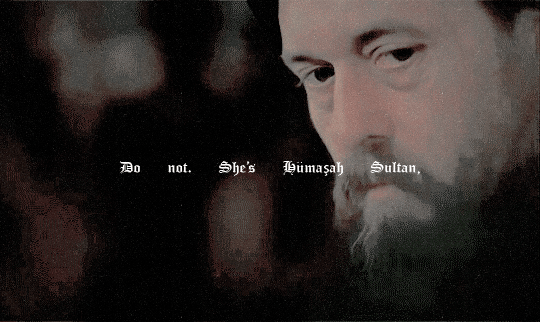

“Bübül, does the Sultana know me from somewhere? How does she know my name?” “Do not. She’s Hümaşah Sultan, the birds send her news even from the Suleyman mosque.”
𝒑𝒔𝒅 𝒃𝒚 © salvia
#magnificent century: kosem#kosem sultan#muhtesem yuzil kosem#humasah sultan#zulfikar agha#magnificent century#mc: kosem
63 notes
·
View notes
Text
The Architects of Islam: Mimar Sinan
Architecture created in the Islamic style was brought to fruition not on its own, but by some of the most outstanding architects to date (in my opinion).
In accordance to this blog, this following post will be dedicated three architects that paved the way to the present ideas and characteristics of Islamic architecture displayed across the world.
To begin this blog, I'll start with Mimar Sinan - who is arguably the most famous architect to build in the Islamic style.
(I apologise for spelling mistakes when it comes to the names of people and locations, through research, there have been several spellings of the same things, and so I used the most common spelling. Please correct me if it is wrong! This applies to all previous and future blog posts.)
Mimar Sinan
Mimar Sinan (1488/1490-1588) was the son of a Greek or Armenian convert to Islam, Abd al-Mannan. He joined the elite corps of the Ottoman army, the janissaries as a young man, like his father before him. During this time of Sinan's life, his talent as an engineer became known - he rose through the ranks in the military becoming an officer in the army who participated in several military campaigns under sultans Selim and Suleiman. As the Ottoman armies marched to new extents in Europe, Africa, and Persia - Sinan accompanied them and organised the engineering corps for the military as well as building mosques and other civil buildings in newly Ottoman cities. In 1539, Sinan was given the position of head architect of the sultan's government in Istanbul (Archive: Islam., 2023).
Mimar Sinan's career saw him undertake a number of projects; 79 mosques, 34 palaces, 33 public baths, 19 tombs, 55 schools, 16 poorhouses, 7 madrasahs, and 12 caravansaries - with the Şehzade Mosque, the Mosque of Süleiman I the Magnificent and the Selim Mosque being his most famous works (the latter was discussed in the previous blog post) - with all three residing in Turkey (Britannica., 1998).
The Ottoman mosques were largely inspired by the architecture of the Hagia Sophia in Istanbul, Turkey (537 AD). Originally built as a Christian church in 537 by the Byzantines, the Hagia Sophia was converted to a mosque to to serve the new Muslim population after Mehmed II's conquest of the city in 1453 - and ever since, Ottoman architects such as Mimar Sinan used the Hagia Sophia's giant dome as a template for the design of Muslim mosques. Due to the grandness in scale and design of the Hagia Sophia, many architects made it their career mission to design something to top the it - including Mimar Sinan as he made it his goal to build a monument to Islam that was more magnificent than the Hagia Sophia.
This led to the one of the inspirations behind the construction of the Suleymaniye Mosque in Istanbul, Turkey. In 1543, one of the Sultan Suleiman's sons, Prince Mehmed, died of smallpox - and in turn Suleyman insisted on building a large mosque in his honour that would serve the local community. Mimar Sinan was tasked with this project, and over four years he worked on what would transition into what is now known as the Şehzade Camii (the Prince's Mosque).

The Sehzade Mosque
Upon completion, the mosque became a landmark of the city, and included not only a mosque but a complex that included a soup kitchen for the poor, a place for travellers to sleep, and a tomb for Prince Mehmed. Sultan Suleiman was extremely pleased with it but Sinan was not satisfied - and insisted he would do better - which leads us back to the inspiration behind the Suleymaniye Mosque.
Sultan Suleiman wanted another giant mosque in Istanbul, with this one being named after himself so he can accumulate the good deeds of Muslims who pray in it after he dies. He wanted it to be a central part of Istanbul's skyline to show the supremacy and glory of Islam (Archive Islam., 2023), this led to the decision of placing the mosque on top of a hill near the Golden Horn - meaning it could be seen for miles around.
There is a rumour that once the foundation was laid, Mimar Sinan went missing for five years! Suleiman was furious with the missing Sinan, and demanded to know where his favourite architect had gone, once the five years had passed, Sinan returned with the explanation that because the building would be so massive, he needed to let the foundations to settle in the soil before above ground building could commence.
The Suleymaniye Mosque was completed in 1557, and the reveal of what is now one of the most significant pieces of Islamic architecture not only to Mimar Sinan's career, but to the architectural world as a whole. Like the Sehzade Mosque, the building did not only serve as a place of worship, but also a kulliye (complex) which held a hospital, public baths, a library - which is still used today - a soup kitchen, numerous schools teaching Quran, a school for Hadith, and a primary school for children. The cemetery in which Sultan Suleiman is buried is also in this location.
Like other mosques in Istanbul, the entrance to the mosque holds a forecourt and a central fountain, and the exterior of the building is decorated with rectangular blue coloured Iznik tile window lunettes. To the south of the mosque is where the madrassa housing a library containing 110,000 manuscripts. There are minarets at all four of the corners of the courtyard, half short and half tall, which is a sign that the mosque was endowed by a sultan, as princes and princesses could only construct two minarets and others could only construct one minaret. Unfortunately, in 1660 the mosque was ravaged by a fire and then restored by Sultan Mehmed IV, then in 1766 part of the dome collapsed during an earthquake, and due to repairs, what was left of the original decoration by Sinan was damaged (Islamic Landmarks., 2023).
And yet, even after Sinan created this masterpiece, which was received incredibly, he still believed he could do much better.
This then transitioned into the commissioning of the Selimiye Mosque in Edirne, which rivalled Hagia Sophia after Suleiman died in 1566. This left his son and successor Selim II in charge and wanting a mosque built in his name, despite being much older when construction began for the Selimiye Mosque, Sinan was determined to make his masterpiece.
The architecture for his masterpiece was discussed in depth in the previous blog.

The Selimiye Mosque
Mimar Sinan died in 1588 at age 98 or 100 (his birth year is unknown) and was buried in the cemetery of the Suleymaniye mosque, near Sultan Suleiman. During life, Sinan built some of the greatest examples of Islamic architecture ever - and is as of 2023, one of the most successful and acclaimed Muslim architects to grace the planet - and the impact on the Muslim world being not limited to just mosques supports his reputation. His apprentices went on to build other major landmarks such as The Blue Mosque (discussed in the previous blog) and notably the Taj Mahal in Agra, India.
His works remain some of the greatest symbols of Islam, centuries after his death and impressive career.
Thank you for reading the first half of this blog - the following blog will discuss my second chosen architect.
Thank you for reading, and hopefully you enjoyed! Please like and share if you did!
Summer Marshall-Miller
Bibliography:
Archive: Islam (2023) The Greatest Architect was a Muslim. Available at:
https://archiveislam.com/the-greatest-architect-was-a-muslim.html (Accessed: March 1, 2023).
Britannica (1998) Sinan. Available at: https://www.britannica.com/biography/Sinan (Accessed: March 1, 2023).
Islamic Landmarks (2023) Süleymaniye Mosque. Available at: https://www.islamiclandmarks.com/turkey/suleymaniye-mosque (Accessed: March 1 2023).
9 notes
·
View notes